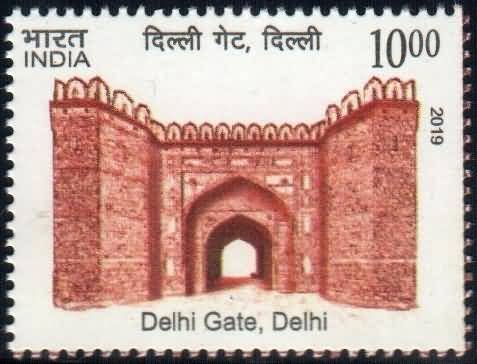Delhi Gate, Delhi

Technical Data
| Stamp Set | Historical Gates of Indian Forts and Monuments |
|---|---|
| Date of Issue | October 19, 2019 |
| Denomination | Rs. 10 |
| Quantity | 500,000 |
| Perforation | 13¼ x 13¾ |
| Printer | Security Printing Press, Hyderabad |
| Printing Process | Wet Offset |
| Watermark | No Watermark |
| Colors | Multicolor |
| Credit (Designed By) | Sh. Brahm Prakash Sh. Pallab Bose |
| Catalog Codes |
Michel IN 3603A Stamp Number IN 3171 Yvert et Tellier IN 3281 Stanley Gibbons IN 3683 |
| Themes | Fortresses / Strongholds | Gates |
Introduction
The Delhi Gate is one of the prominent historical entrances to the walled city of Shahjahanabad (Old Delhi). It stands as a remarkable example of Mughal architecture and reflects the grandeur and strength of the Mughal Empire.
Historical Background
Built in 1638 A.D. by Mughal Emperor Shah Jahan, the Delhi Gate served as the southern gateway to the fortified city. Emperor Shah Jahan used this gate to travel between his royal residence, the Red Fort, and the Jama Masjid, one of the largest mosques in India.
Architectural Features
The Delhi Gate is constructed primarily from red sandstone and is adorned with intricate carvings, turrets, and domes. The architectural design bears a close resemblance to the Kashmere Gate, which served as the northern entry point to the city.
The structure showcases the graceful ornamentation and symmetry that define Mughal design, combining both defensive strength and artistic beauty.
Connectivity and Significance
The road passing through the Delhi Gate, known as Daryaganj, connects the historic Old Delhi with New Delhi, symbolizing the link between India’s past and present. Nearby, remnants of the original fort walls still stand, extending towards the Old Delhi Railway Station.
Preservation and Legacy
Today, the Delhi Gate is a protected monument under the Archaeological Survey of India (ASI). It continues to be a significant heritage landmark, representing the architectural excellence and urban planning of the Mughal era. The gate remains a proud emblem of Shahjahanabad’s rich cultural and historical legacy.
Commemorative Stamp Release
To honor these historic gateways, symbols of India’s defensive strength, royal pride, and architectural mastery, the Department of Posts proudly released a Commemorative Postage Stamp on “Historical Gates of Indian Forts and Monuments.” The stamp pays tribute to these timeless structures that continue to bridge India’s glorious past with its vibrant present.
Conclusion
A timeless symbol of Mughal craftsmanship, the Delhi Gate not only stands as a historical structure but also as a bridge connecting the glorious past of Old Delhi with the modern spirit of New Delhi — a testament to the enduring legacy of India’s architectural heritage.

Leave a Comment
You must be logged in to post a comment.